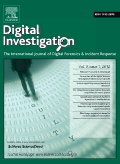CALL FOR PAPERS
ICDF2C 2013
Keeping up with our international theme at ICDF2C, we are proud to announce this year that ICDF2C 2013 will run in parallel to InfoSecurity Russia 2013, the premiere information security industry event in Russia. We are also proud to announce that starting with this year's conference, ICDF2C is collaborating with the Journal of Digital Investigation, the leading international journal in the area of digital forensics and incident response. In addition to the publication of the proceedings in the Lecture Notes of the ICST, the best research papers presented at ICDF2C 2013 will be expanded and peer reviewed for a special issue of the Journal of Digital Investigation.
Participants in the 2013 conference will be able to attend both the InfoSecurity Russia event and ICDF2C and hear the latest developments in both research and industry. The conference provides a venue which offers chances for networking and high-quality training through expert speakers, state-of-the-art work from researchers all around the world, and tutorials on digital forensic techniques and methods of cyber crime investigation. This ICST conference is endorsed by EAI.
SCOPE:
The Internet has made it easier to perpetrate crimes by providing criminals an avenue for launching attacks with relative anonymity. The increased complexity of the communication and networking infrastructure is making investigation of the cybercrimes difficult. Clues of illegal activities are often buried in large volumes of data that needs to be sifted through in order to detect crimes and collect evidence.
The field of digital forensics and cybercrime investigation has become very important for law enforcement, national security, and information assurance. This is a multidisciplinary area that encompasses law, computer science, finance, telecommunications, data analytics, and policing. This conference brings together practitioners and researchers from diverse fields providing opportunities for business and intellectual engagement among attendees.
The following topics highlight the conference's theme:
• Business Applications of Digital Forensics
o e-Discovery,
o Civil Litigation Support,
o Incident Response
• Cyber Crime Investigations
o Online Fraud,
o Money Laundering,
o Hacking,
o Malware & Botnets,
o Sexual Abuse of Children on Internet
o Software & Media Piracy
• Digital Forensics Techniques and Tools
• Digital Forensics Process & Procedures
• Theoretical Foundations of Digital Forensics
• Digital Forensics & Law
• Mobile / Handheld Device & Multimedia Forensics
• Digital Forensics Standardization & Accreditation
• Cyber Criminal Psychology and Profiling
• Cyber Culture & Cyber Terrorism
• Information Warfare & Critical Infrastructure Protection
RESEARCH PAPERS:
Papers describing original unpublished research are solicited. Submissions must not be concurrently under review by a conference, journal or any other venue that has proceedings.
Papers in the topic areas discussed are preferred, although contributions outside those topics may also be of interest. Please feel free at any time to contact the conference general chair if you have questions regarding your submission.
BEST PAPER AWARD:
The program committee may designate up to three papers accepted to the conference as ICDF2C Best Papers. Every submission is automatically eligible for this award.
OTHER SUBMISSION CATEGORIES
Submissions can be made in a number of categories: Completed research papers, research-in-progress papers, industrial talks, panel and tutorial proposals, and round table discussions. Please follow the following guidelines in preparing your submission.
• Completed Research Papers: No longer than 16 pages (including abstract, figures, tables and references).
• Research in Progress Papers: No longer than 8 pages (including abstract, figures, tables and references).
• Industrial Talk: Typically a 1,000 word description of the proposed talk. All talks must be vendor neutral.
• Round Table Discussion: Typically a 1,000 word synopsis of the topic area.
• Panel Proposals: Typically a 1,000 word description, identifying the panelists to be involved.
• Tutorial Proposals: Typically a 1,000 word description of topic(s), potential speakers, program length, and potential audience. Also, include proposer resume(s).
SUBMISSION INSTRUCTIONS:
Paper submission will be handled electronically. Papers must be formatted using Springer LNICST Authors' Kit (https://icst.org/lnicst-guidelines-for-authors/) and submitted only through the Confy conference management system following the instructions that can be found in the conference web site.
All submitted papers will be judged based on their quality through double-blind reviewing. Authors' names must not appear in the paper.
All other submissions should be sent via email to the conference general chairs (Dr Pavel Gladyshev at [email protected] and Dr Ibrahim Baggili at [email protected]).
PUBLICATIONS:
Accepted papers will be published in the ICDF2C 2013 Conference Proceedings and by Springer-Verlag in the Lecture Notes of the Institute for Computer Sciences, Social-Informatics and Tele-communications Engineering (LNICST) series.
The proceedings will be available both as paper-based copies and via Springerlink, Springer's digital library. In addition, the content of the proceedings will be submitted for inclusion in leading indexing services, including DBLP, Google Scholar, ISI Proceedings, EI, CrossRef and Zentralblatt Math, as well as ICST's own EU Digital Library (EUDL).
In addition, the best conference papers will be published by Elsevier in an expanded form after additional peer review in a special issue of the Journal of Digital Investigation.
IMPORTANT DATES
Paper Submission: 17 May, 2013
Notification of Acceptance: 17 June, 2013
Camera-ready Version: 1 September, 2013






































